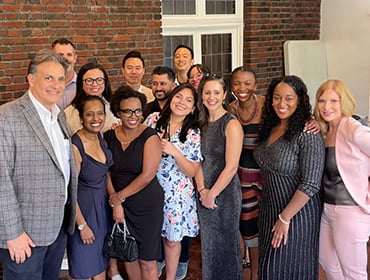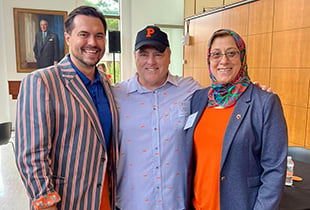How Top Schools Invest In Student Success
THIS GUIDE IS NO LONGER ACTIVE. For the current FP Guide, click here.
Princeton University, Princeton School of Public and International Affairs
Full Financial Support Breaks Down Barriers for Ivy League Education

Among the many factors that distinguish the Princeton School of Public and International Affairs (SPIA) is its commitment to making a graduate education financially accessible to students from all communities, no matter where in the world they are from or currently live. Every student admitted to Princeton SPIA receives full financial support that covers the complete cost of tuition and student health insurance, and a generous stipend to cover living expenses.
“We have a long history of generously funding our graduate students, a feature we think is differentiating,” says Assistant Dean for Global Outreach, Admissions, and Alumni Engagement Steven F. Petric. “We work hard to provide financial support that ensures students can focus on their studies while at Princeton SPIA and in their public service careers after graduation.”
Public service is central to everything at Princeton SPIA, from how it conducts its admissions process to the ways in which it cultivates graduates who will work on the world’s most pressing policy challenges. When building its student community, the school looks for a dedication to public service, academic excellence, and leaders who make an impact.

“We work hard to provide financial support that ensures students can focus on their studies while at Princeton SPIA and in their public service careers after graduation.” –Steven F. Petric, Assistant Dean for Global Outreach, Admissions, and Alumni Engagement, Princeton School of Public and International Affairs, Princeton University
“We are a supportive community, bound together by our commitment to public service and to one another — we aim to cultivate that in our admissions process,” Petric says. “We know that we won’t all agree on the same way forward. But we can look for common ground.”
Princeton SPIA is known for its rigorous academic training that prepares students for international and domestic policy careers that address the world’s most complex, consequential policy challenges. The school offers a Master in Public Affairs (two years) and a mid-career Master in Public Policy (one year), both of which allow students to choose among four fields of concentration and three optional certificate programs.
Small class sizes and access to first-rate faculty who are invested in students’ success are also distinguishing factors of a Princeton SPIA education. “We’re a small, tight-knit community,” Petric notes. “You’ll get an excellent education at an institution that has a pervasive commitment to service — everyone will know your name, your goals.”
Graduate students at Princeton SPIA benefit from a robust support network that extends beyond its highly involved faculty. The Career Development and Alumni Affairs teams, for example, provide comprehensive assistance and plentiful resources for students’ academic and professional growth.
Qualities of Successful Applicants
Princeton SPIA takes a holistic approach to admissions that considers a variety of perspectives and multiple indicators of success, beyond only those measured on a transcript. Those markers include impactful leadership, a resolve to create positive solutions, and a sincere commitment to public service. This commitment to public service should not only serve as the impetus for career aspirations, but it should also be evidenced through prior full-time professional and volunteer work.
“We look for a demonstrated commitment to public service and for committed, passionate individuals working on behalf of their communities,” Petric says.
Princeton University, Princeton School of Public and International Affairs
https://spia.princeton.edu
[email protected]
609-258-4836![]()
Contents
- How Top Schools Invest In Student Success
- George Washington University, Elliott School of International Affairs
- Rice University, School of Social Sciences
- Princeton University, Princeton School of Public and International Affairs
- Augusta University, Pamplin College of Arts, Humanities, and Social Sciences
- The Fletcher School at Tufts University
- Indiana University, Hamilton Lugar School of Global and International Studies
- Columbia University, School of International and Public Affairs
- Penn State University, School of International Affairs
- Texas A&M University, Bush School of Government & Public Service
- Georgetown University, School of Foreign Service
- University of Denver, Josef Korbel School of International Studies
- Yale University, Jackson School of Global Affairs
- George Mason University, Schar School of Policy and Government
- American University, School of International Service
- Seton Hall University, School of Diplomacy and International Relations
- Johns Hopkins University School of Advanced International Studies
